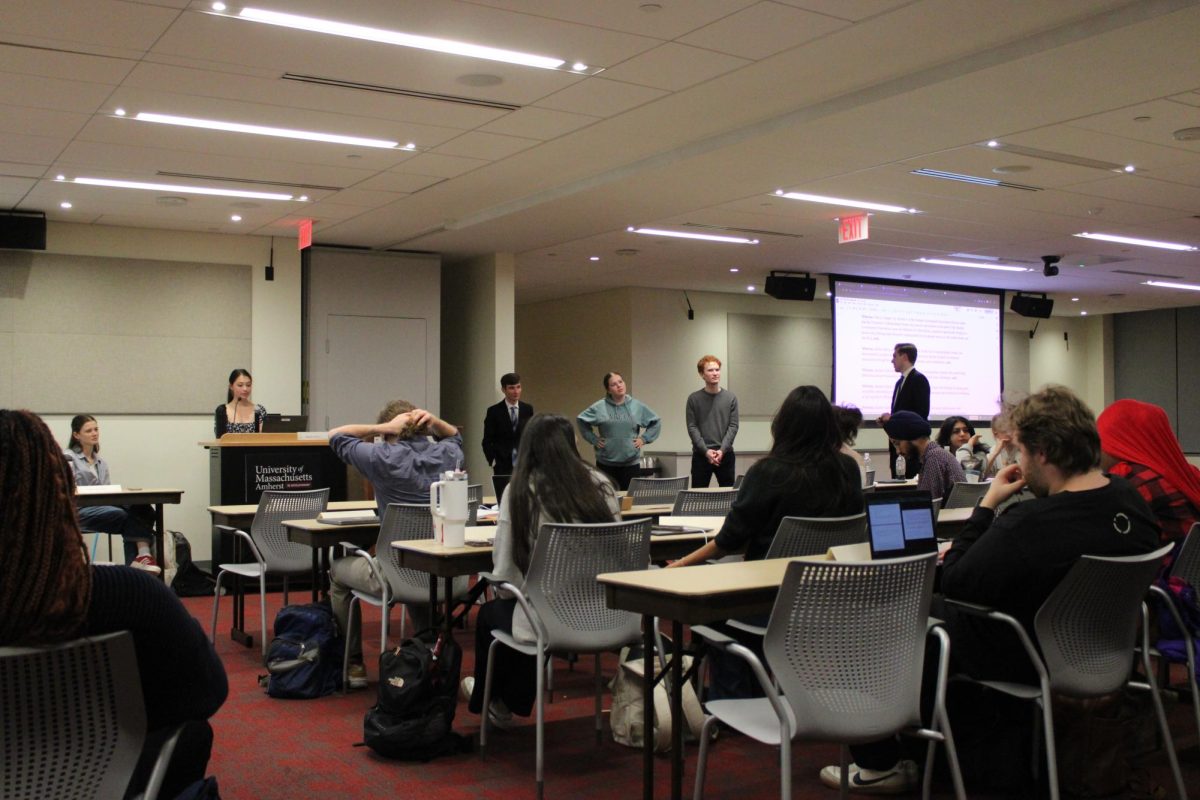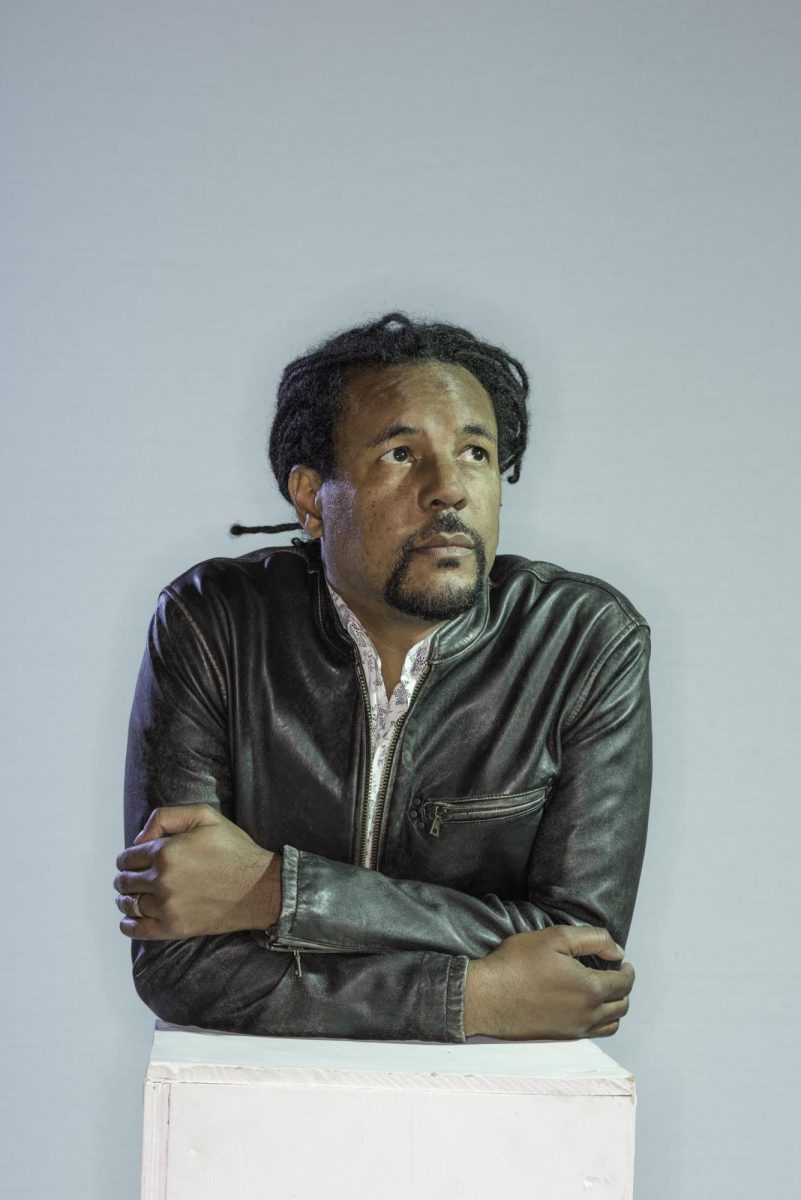Ambassador Dennis Ross, a leader in U.S. involvement in the Middle East peace process, spoke in front of over 100 students and community members about Iran, the Israel-Palestine conflict and the Trump administration.
The event, held as part of the Student Alliance for Israel’s “Israel Peace Week,” was co-sponsored by the Student Alliance, UMass Democrats and UMass Republicans. Student Alliance president Stephanie Margolis said Ross was invited as a speaker for his “bipartisan experience.”
Ross’ work experience with four different presidential administrations – Reagan, H.W. Bush, Clinton and Obama – often causes people to ask how he was able to work across party lines.
“I’ve spent 30 years working with Israelis and Arabs,” Ross laughed. “How hard could it be?”
Margolis, a junior hospitality and tourism and Judaic studies double major, said that once Ross was confirmed for the event, the Student Alliance brought in the other sponsors to emphasize the “bipartisan” approach needed to Israel.
“Israel Peace Week is to bring Israel in and talk about what it’s like in the peace process,” Margolis said. “To talk about long-term goals [and] bring new ideas to the table.”
Ross’ career spans more than 30 years, covering a host of issues including the former Soviet Union, unification of Germany, arms control negotiations and the Gulf War. The author of several books on the peace process, Ross will publish a new book in September with his colleague David Makovsky, titled “Be Strong and of Good Courage: How Israel’s Most Important Leaders Shaped Its Destiny.”
During the lecture, Ross said the new book will profile four different Israeli prime ministers who made “historic choices” and explore what lessons can be learned from those decisions.
According to Ross, 1993 marked a significant change in the way the Middle East was viewed in Western politics, then characterized as the “new Middle East.” Established not by borders but “knowledge-based societies,” the “new Middle East” was expected to modernize and move forward politically, socially and economically.
“It’s a highly desirable vision, but I think it’s fair to say it didn’t materialize,” Ross explained, noting the destabilization of Middle Eastern affairs in the Sept. 11 terrorist attacks, rise of Al Qaeda and the wars in Iraq, Afghanistan and Syria.
“There’s a deeper reality going on in the region that hasn’t been grasped,” he said.
Rather than a “new Middle East,” the Middle East today is a “new normal, not normalization.” Through personal anecdotes of working in the field of foreign policy, Ross explained that Middle Eastern countries and their representatives are working cooperatively on issues like Iran and Syria – a new normal – but don’t emphasize that relationship publicly, lacking normalization.
Following perceived loss of American protection under both the Obama and Trump administrations, Arab leaders sought partners in dealing with Iranian aggression, the Syrian Civil War and a rise in terrorism, Ross said. Russia, as part of the problem, couldn’t be relied on.
China, Ross explained, was viewed as looking for economic expansion rather than providing security. The Europeans were “from Athens, not Sparta,” and unable to provide military support.
“Arab leaders increasingly see the Israelis as their natural partners,” Ross said. However, the countries don’t recognize this relationship publicly, according to Ross. “If you want normalization, you have to deal with the Palestinian issues.”
Moving into the conflict between Israel and Palestine, Ross said that Palestinians, in seeing themselves as the weakest player, are unwilling to make concessions to reach a deal with Israel.
“[Palestine] never developed the strategy to be anything but a victim,” Ross said. “Both Israelis and Palestinians have lost faith in peacemaking.”
The role of Arab leaders, he said, shouldn’t be to tell Palestinians what to do, but to get directly involved in the process. For a successful peace deal to work, Egypt, Jordan, Saudi Arabia, the United Arab Emirates and Morocco would need to recognize a proposed deal as a “serious basis for negotiation,” according to Ross.
The Trump peace plan, which hasn’t yet been publicly announced, doesn’t have the necessary groundwork to succeed, Ross said. Not necessarily opposed to all actions taken by the administration, Ross said that he disagreed with the ways they were presented; rather than being part of the plan, the decisions made by Trump seemed to counteract or undermine any plan for Middle Eastern policy.
“Trump has a concept of maximum pressure,” he said while referencing the administration’s defunding of numerous Palestinian organizations without the reallocation of funds. “If defiance is [the Palestinians] emblem, and you put pressure on them, what is their response going to be?
“To defy you,” he answered.
Tahlee Yichye, a sociology and communications disorders junior, said that she attended the talk as an Israeli student interested in learning more about Ross’ experience. The talk “surpassed her expectations,” and her biggest takeaway was that “there’s a lot of working pieces, and not [just] one person to blame.”
Looking to the future of Middle Eastern policy, Ross said that there is a “cultural hostility” that needs to be overcome for any progress to be made, particularly if a two-state solution is to be reached in Israel and Palestine. While he wasn’t hopeful this would be resolved in the immediate future, he added, “something is changing.”
Kathrine Esten can be reached at [email protected] and followed on Twitter at @KathrineEsten.





















NITZAKHON • Apr 3, 2019 at 9:13 am
The Hamas charter says that Israel will exist until Islam destroys it, as it has destroyed others.
The “Palestinian” Authority has elected to pay its terrorists rather than salaries for teachers. That tells you their priorities as well.
Israel has offered, time and again, land for peace. After the 1967 war Israel offered to give the whole kit-n-caboodle back in exchange for peace. More recently, in 2008 Israel offered Gaza (which it had vacated three years before, getting over 1000 missiles a year, every year, since then in reply to this day), over 90% of the West Bank, and a corridor connecting the two. They said NO.
So with a people whose stated goal is your destruction, just what is there to negotiate?